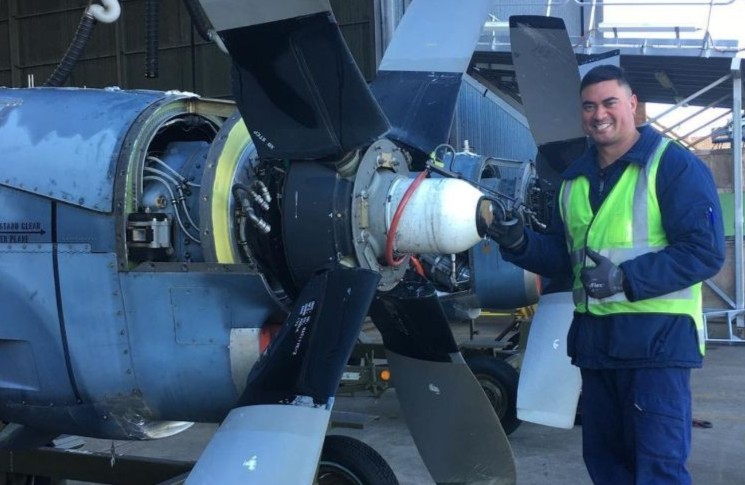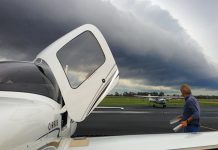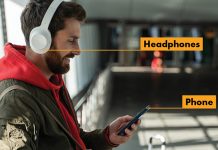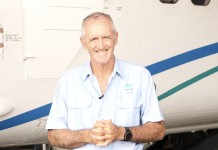Jacob Mani has worked in aviation for more than 15 years and seen more of Australia than most people, but his ticket to travel was not flying aircraft but aircraft maintenance engineering.
One of this year’s CASA aircraft maintenance engineer scholarship recipients, Jacob has maintained Defence fixed wing aircraft like Lockheed C-130 Hercules and P3 Orions in New South Wales, Boeing CH-47 Chinook rotary wing helicopters in Queensland, as well as a stack of different commercial jets in desert storage in Alice Springs during COVID-19.
Unlike many who fall in love with aviation at a young age, Jacob always wanted to be an aircraft engineer.
‘I’ve always wanted to be an engineer, never really had any ambition to fly,’ says Jacob.
‘The big planes used to fly right over our house when I was a kid growing up in Auckland, and I was just interested in how does that big piece of metal float in the sky? I was fascinated.’
Jacob and his family moved to the Sunshine Coast in Queensland when he was around 11 years old. Jacob started his aviation career with a school-based traineeship at his local general aviation airport, Caloundra Airport, at just 15 years old. By the time he had finished Year 12, he had already completed his Certificate 2 in Aeroskills (Mechanical) and went on to fund his own study with Aviation Australia to complete his theory in Certificate IV in Aeroskills (Mechanical).
‘I came from a background where no one had worked in aviation before so the hardest part for me, looking back, was how to find a structured pathway for a successful career in aviation. It can be very confusing when you just finish school. I was lucky in a way, because I knew what I wanted to do and I had help from my career counsellor to show me a structured path I could follow. I’d definitely recommend it; it’s been a great career for me.’
With his Certificate IV theory finished, Jacob landed an apprenticeship at just 17 with Qantas Defence Services (now Northrop Grumman Australia) doing heavy maintenance for the Royal Australian Air Force out of its Richmond, NSW base. He completed his Certificate IV practical and his apprenticeship and stayed on for another year before moving across to Australian Aerospace (now Airbus Australia), still at the Richmond RAAF base, to work on Lockheed C130 Hercules and P-3C Orion aircraft. He then met his future wife and decided to move back to the Sunshine Coast.
‘There weren’t a lot of aviation jobs in Brisbane at that time, so I got a job with Bombardier Transport building electric trains for Brisbane’s CBD. It was something different for me; they were a great bunch of guys and I learned so much about computers. I did that for about a year and a half but decided it wasn’t for me, so I came back to aviation.’
Jacob took a role contracting in the Qantas hanger working heavy maintenance on A330s and 737s at Brisbane Airport for around 5 months and then took a job with Virgin Australia in late 2019.
The COVID-19 pandemic hit, commercial aviation was grounded and like many other Australians working in the industry, Jacob was laid off.
It was very bad timing. Jacob and his wife had spent a year living with his parents while building their house and they were due to pick up the keys and move in.
A silver lining to the pandemic
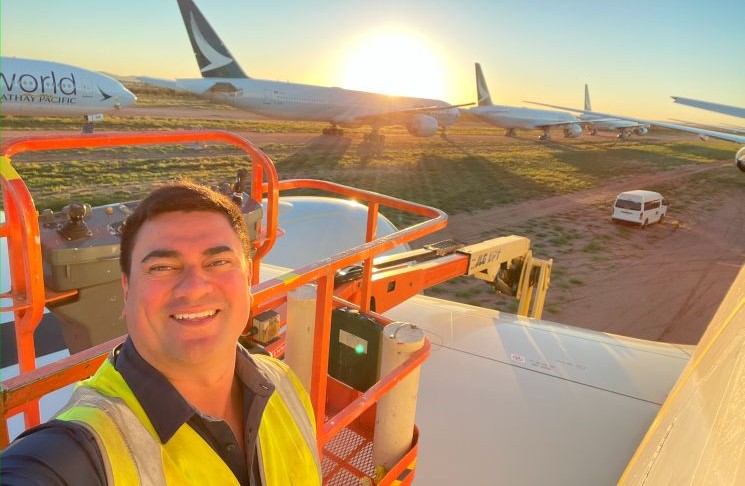
Having taken his employment away, COVID then provided Jacob with an opportunity –fly-in, fly-out aircraft maintenance with Asia Pacific Aircraft Storage (APAS) tending to all the aircraft parked in Alice Springs. At the height of the pandemic, more than 150 aircraft from a range of airlines were stored there.
‘I was working in Alice Springs doing fly-in, fly-out work maintaining all the big jets that were out there in storage. I spent about 10 months doing that; that was an interesting time. It was like working on a farm but with aircraft everywhere.’
‘I got a lot of big jet experience there. I was working on Boeing 777s, 737s and 787s and Airbus A320s, A330s and A380s.’
After a few months of travelling to and from Alice Springs for work, Jacob was offered a role with Boeing Defence Aus working on Chinook helicopters at the Oakey Army base near Toowoomba. Two years later he moved to Jetstar Engineering, where he is still employed.
‘I really enjoyed working at Boeing Defence but I wanted to be closer to home and I haven’t looked back.’
‘The team at Jetstar are a good bunch of people and for me, I get to be home every night of the week. I’ve got a son on the way so being at home is a priority for me at this stage of my life.
Starting over as a civilian aircraft engineer
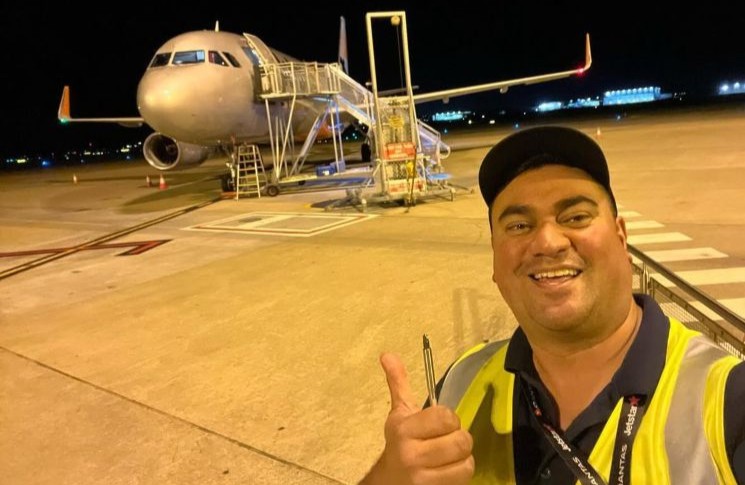
While Jacob has extensive experience with both rotary and fixed wing aircraft, most of his experience has been on military aircraft.
‘I had a signing authority on military aircraft but in the civilian world you have to obtain your CASA Part 66 licence. Unfortunately, because I did my apprenticeship so many years ago, my theory wasn’t recognised. That’s why the CASA scholarship is such a big help to me as I start doing all my theory components again this year to get my Part 66 licence.’
He completed his first civil aircraft type course in July for an A320 and is aiming to get his diploma by the end of this year.
‘My head’s been in textbooks for the past couple of months, and I‘ve been in and out of courses around the country, so I can’t wait for it to be complete and go from there!’
His favourite part of the job?
‘Trouble shooting a particular job I haven’t encountered before, learning that particular system and how it works, and rectifying the fault is probably the most rewarding part of my job, I’d say.’
‘You’re kind of like a jack of all trades in a way. You could be fixing a tap in the lavatory or servicing an engine.
‘The great thing about aircraft engineering is the skills you learn, you can use in other fields. You earn good money, you get to explore, you get to travel. If you get the right credentials on your licence you can go anywhere you want, really.’

